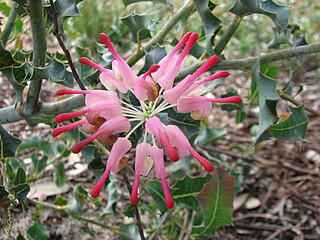
Grevillea humifusa, commonly known as spreading grevillea, is a species of flowering plant in the family Proteaceae and is endemic to a restricted area of the south-west of Western Australia. It is a prostrate shrub with long, trailing stems, divided lives with linear lobes and clusters of pink to pale red and cream-coloured flowers with a reddish, yellow-tipped style.

Grevillea curviloba is a species of flowering plant in the family Proteaceae and is endemic to the south-west of Western Australia. It is a prostrate to erect shrub with short branchlets, divided leaves with linear to narrowly lance-shaped lobes with the narrower end towards the base, and white to cream-coloured flowers.

Grevillea bipinnatifida, commonly known as fuchsia grevillea, is a species of flowering plant in the family Proteaceae and is endemic to the south-west of Western Australia. It is a spreading shrub, usually with bipinnatifid leaves and loose clusters of dull pink to crimson flowers.

Grevillea annulifera, also known as prickly plume grevillea, is a species of flowering plant in the family Proteaceae and is endemic to northern Western Australia. It is a spreading to erect shrub with pinnatisect leaves with five to nine sharply-pointed, linear lobes, and cream-coloured to pale yellow flowers.

Grevillea bedggoodiana, commonly known as Enfield grevillea, is a species of flowering plant in the family Proteaceae and is endemic to a restricted area near Ballarat in Victoria, Australia. It is a prostrate to low-lying shrub with coarsely serrated, egg-shaped to oblong leaves and green and pink flowers.

Grevillea acropogon is a species of flowering plant in the family Proteaceae and is endemic to a restricted part of southwestern Western Australia. It is a prostrate to erect shrub with pinnatisect leaves with five to seven sharply-pointed lobes, and red flowers.

Grevillea plurijuga is a species of flowering plant in the family Proteaceae and is endemic to southern Western Australia. It is a prostrate to low-lying or dense mounded to erect shrub with divided leaves with linear lobes and loose clusters of hairy, red or pink flowers.

Grevillea dryandroides, commonly known as phalanx grevillea, is a species of flowering plant in the family Proteaceae and is endemic to the south-west of Western Australia. A diffuse, clumping shrub, it often forms suckers and has divided leaves with up to 35 pairs of leaflets, and groups of red to pinkish flowers on an unusually long, trailing peduncle.

Grevillea althoferorum, commonly known as the split-leaved grevillea, is a species of flowering plant in the family Proteaceae and is endemic to a restricted area of Western Australia. It is a compact, rounded shrub with sharply-pointed, deeply lobed leaves and dull yellow flowers with a creamy-yellow style.

Grevillea insignis, commonly known as wax grevillea, is a species of flowering plant in the family Proteaceae and is endemic to the south-west of Western Australia. It is an erect, bushy shrub with more or less oblong leaves with seven to seventeen sharply-pointed, triangular teeth, and more or less spherical or cylindrical clusters of cream-coloured flowers ageing to pink.

Grevillea amplexans is a species of flowering plant in the family Proteaceae and is endemic to the Mid West region of Western Australia. It is a spreading shrub with arching branches, stem-clasping, sharply-pointed, lobed or toothed leaves and white to cream-coloured flowers.

Grevillea calliantha, commonly known as Foote's grevillea, Cataby grevillea or black magic grevillea, is a species of flowering plant in the family Proteaceae and is endemic to a restricted part of the south-west of Western Australia. It is a spreading, compact shrub with pinnatipartite leaves with linear lobes, and pale yellow to apricot-coloured flowers with a maroon-black to reddish style.

Grevillea coccinea is a species of flowering plant in the family Proteaceae and is endemic to the south of Western Australia. It is a low-lying or sprawling shrub with narrowly wedge-shaped to linear leaves and white, cream-coloured, and red or yellow flowers.
Grevillea crowleyae is a species of flowering plant in the family Proteaceae and is endemic to a restricted area in the south-west of Western Australia. It is a dense, spreading shrub with deeply divided leaves usually with three to seven linear lobes, and grey, pale yellowish or greenish flowers with a maroon-black style.

Grevillea hislopii is a species of flowering plant in the family Proteaceae and is endemic to a restricted area of the south-west of Western Australia. It is a dense, single-stemmed shrub with linear to narrow elliptic leaves and clusters of hairy, whitish-grey flowers.
Grevillea nivea is a species of flowering plant in the family Proteaceae and is endemic to the south of Western Australia. It is a dense shrub with spreading to ascending branches, crowded, divided leaves, the end lobes linear, and dense clusters of red flowers.

Grevillea patentiloba is a species of flowering plant in the family Proteaceae and is endemic to the south-west of Western Australia. It is a prostrate to erect, spreading to straggling shrub with divided leaves, and down-turned clusters of red to deep pink and cream-coloured to bright yellow flowers with a red to deep pink style.
Grevillea prominens is a species of flowering plant in the family Proteaceae and is endemic to a restricted part of the South West region of Western Australia. It is a shrub with divided leaves, the end-lobes linear to narrow triangular, and creamy-white flowers usually projected beyond the foliage.

Grevillea prostrata, commonly known as the Pallarup grevillea, is a species of flowering plant in the family Proteaceae and is endemic to a small area in the southwest of Western Australia. It is a prostrate shrub with more or less pinnatisect leaves and pink and white flowers with a white style.

Grevillea pyramidalis, commonly known as the caustic bush, is a species of flowering plant in the family Proteaceae and is endemic to north-western Australia. It is an erect, spindly shrub or small tree with simple linear or pinnatisect leaves with linear to narrowly egg-shaped lobes, and white to yellow or cream-coloured flowers.


















